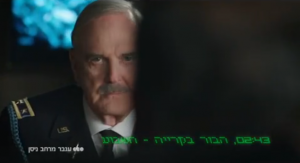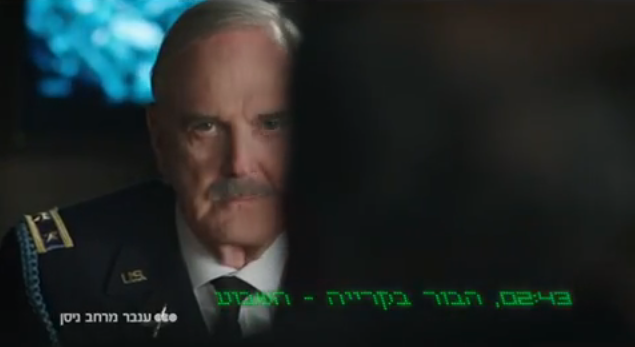 Israelis are being sold on war with Iran in more ways than one.
Israelis are being sold on war with Iran in more ways than one.
In a commercial featuring John Cleese (a veteran of the zany British comedy shows, Monty Python’s Flying Circus and Fawlty Towers), a high level general takes a taste of a delectable chocolate and hazelnut spread and inadvertently sets in motion an Israeli military strike on an unnamed country — Iran by implication and context — a command that the Israelis have been waiting for and are eager to carry out.
The ad’s tour de force hinges on a pun. Three high level military officers, for whom “General Rogers” (Cleese) is the spokesman, are seated at a table in a war room. Across the table is a silver-haired man flanked by two military officers trying to persuade the generals to authorize an attack that they are apparently reluctant to approve. “I promise you we will be in and out in 33 minutes,” the silver-haired civilian tells them. “We have the right to defend ourselves!” Mulling what the panel’s response ought to be, Cleese opens the container of chocolate-hazelnut spread that happens to be on the tablet, removes the inner liner and licks it. Impressed, he reads the product’s name aloud: Sababa Egozim. Adweek claims the phrase translates into something like “Let’s get nuts.” According to Gabe Fisher in the Times of Israel:
“Sababa” means “cool” in Israeli slang (taken from the Arabic, like many Hebrew slang words) and “egozim” are “nuts.” Put together, though, the term is slang for “super cool” or “hell yeah.”
Whatever the translation, the Israelis construe Cleese’s utterance as the generals’ official approval of a military strike. Delighted, they give one another victorious high five signs and triumphantly exit to launch their attack.
Tim Nudd of Adweek has criticized the promotional video for being “weird” and has faulted the offbeat comic for doing anything for money. An earlier version of the Adweek article, quoted by the British website, The Drum, apparently included the observation, “What would the young, rebellious Cleese, at the height of his powers in the early 1970s, say if he could see the depths to which his septuagenarian self has sunk?” Cleese reportedly received $50,00o for appearing in the ad, which was filmed in Monaco, where he lives.
This isn’t the first case of an Israeli commercial finding humor in Israel’s bellicose relationship with Iran. Last February — a few weeks after the assassination of an Iranian nuclear scientist, Mostafa Ahmadi Roshan, that was widely believed to have been carried out by the Mossad — a commercial for the Israeli cable company HOT featured four characters from the Israeli television series Asfur. Poorly disguised as Iranian women, the foursome wonder how they’ll be able to find Kosher food in Iran. They meet a Mossad agent who is watching their show on his Samsung tablet. While examining the numerous features of the tablet, which the cable company was offering for free in a promotion, one of the “women” accidentally touches a button that causes a nearby nuclear plant to explode. The timing of the commercial also coincided with an upsurge in media speculation that Israel was indeed on the verge of attacking Iran this past spring.
Iranians didn’t think the ad was very funny. Iran’s Press TV objected to the ad’s assumption that Israel was powerful enough to easily destroy Iran’s nuclear facilities, and its lighthearted view of the assassination of the country’s nuclear scientists. Arsalan Fathipour, an Iranian lawmaker who heads the Energy Committee of Iran’s parliament, called for a ban on the import of all Samsung products, objecting to Samsung’s attempt to curry favor with Israelis through the commercial. A Samsung spokesperson in Iran insisted that HOT — not Samsung — had produced the ad and was not responsible for its contents, while Samsung’s Dubai office condemned the role of the company’s Israel office in the production.
What do these Israeli commercials that make light of Israeli attacks and sabotage against Iran reveal about the prospects for war? Joking about attacking Iran may function as an emotional safety valve for Israelis, allowing them to cope with a geopolitical situation that may be spinning out of control. Iranians can hardly be blamed if they don’t appreciate the humor. An optimist might opine that Israelis being able to find amusement in attacking Iran could indicate that an actual strike is less likely.
But humor about an attack on Iran may also signal a darker trend in Israeli popular culture: the acceptance that war with Iran is inevitable, so Israelis might as well take it in stride, sit back and enjoy the show.






Pretty funny – I think it’s an Antiwar plug, but unfortunately that aspect will go over the heads of the War Nuts